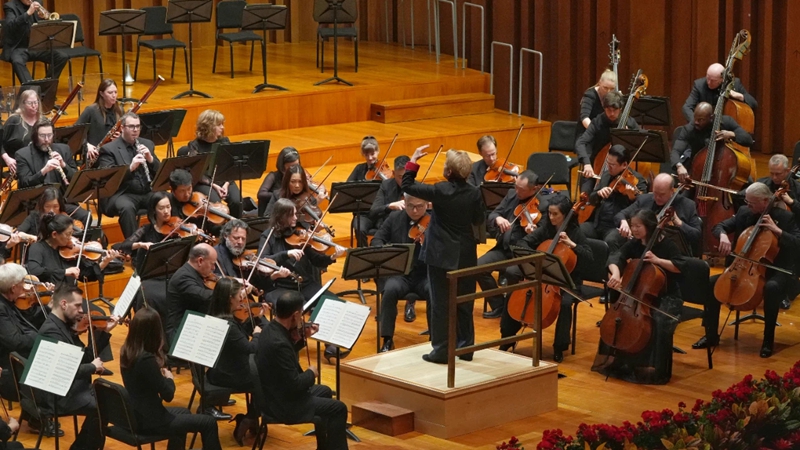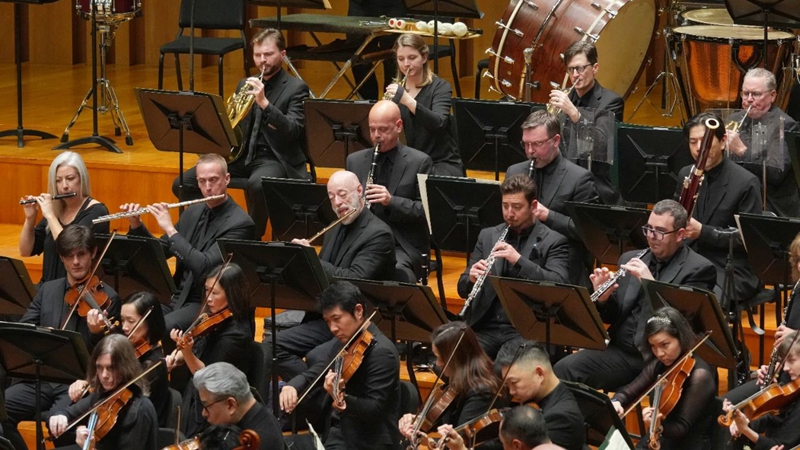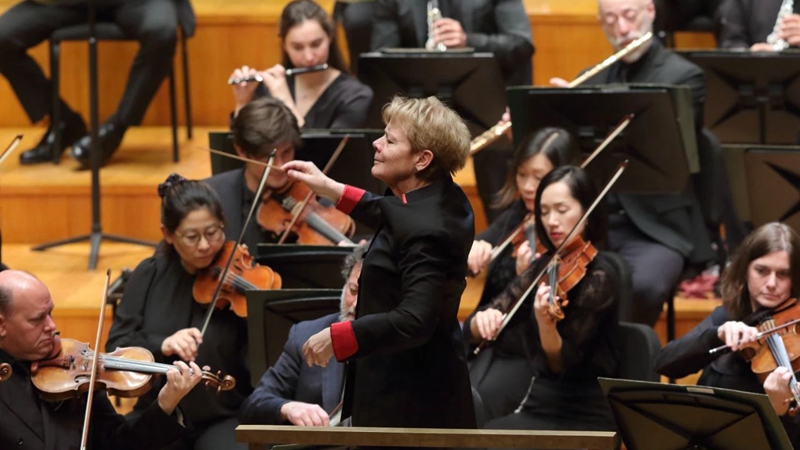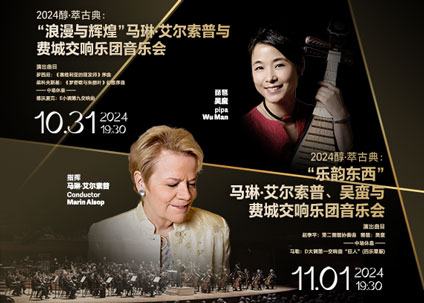In 1973, as the first American orchestra visiting China, the Philadelphia Orchestra set the stage for more Sino-U.S. culture exchanges. Over the past 50 years since then, the Philadelphia Orchestra has toured major Chinese cities 12 times, forming a profound friendship forged between the two peoples through the music presented by this faithful, old friend.
In November 2023, some members of the Philadelphia Orchestra arrived at the NCPA and carried out a series of activities in commemoration of the 50
th anniversary of the Orchestra’s first visit to the country. At this vital moment, Chinese President XI Jinping penned a letter in reply to Matías Tarnopolsky, President and CEO of the Philadelphia Orchestra, and wrote that Music knows no borders while culture serves as a bridge, and hope the Philadelphia Orchestra will join hands with artists from all over the world, including Chinese and American counterparts, to conduct close exchanges and cooperation in a civilised and equitable manner with mutual learning, communication and inclusiveness as the core, so as to promote the prosperity of art for further Sino-U.S. cultural exchanges and to deepen the friendship between different peoples. As a national performing arts centre, the NCPA has thoroughly studied and implemented the spirit of the letter. Then with higher cultural confidence, an open mind and dedication to cultural inheritance and innovation, the NCPA continues to deepen its exchanges and cooperation with the Philadelphia Orchestra and numerous other outstanding art institutions and artists from all over the world, in order to do something special for boosting development of Chinese civilisation.
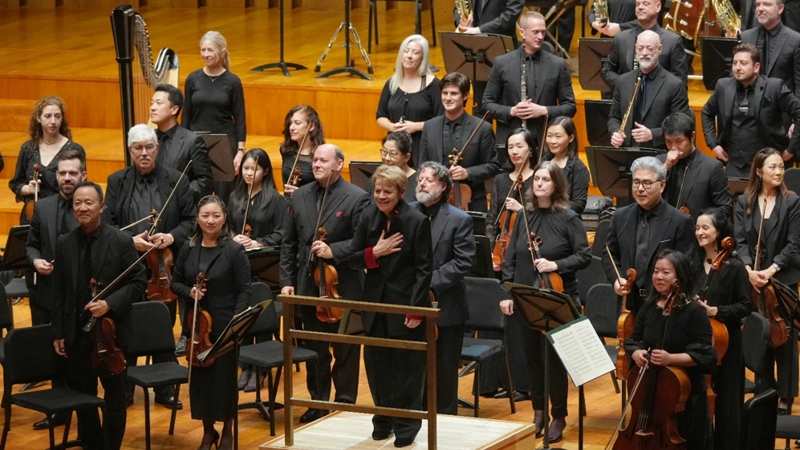
On the evening of October 31
st, history was once again written as the fully-staffed Philadelphia Orchestra returned to the stage of the NCPA after 2019, under the baton of Principal Guest Conductor Marin Alsop. The concerts was a musical journey for Chinese audiences and renews the musical friendship between the people of China and the United States.
When Rossini’s Il Barbiere di Siviglia Overture leaped into the ear, the Concert Hall felt dynamic suddenly. The strings bounced up and down trippingly, sounding as if there were cheerful elves dancing on the stage. The woodwind music gradually became bright, sounding as if laughter from a myriad of twinkling lights were pervading into the air.
Afterwards, Tchaikovsky’s Roméo et Juliette Prelude was played, and under Marin Alsop’s baton, the Orchestra created a solemn but romantic atmosphere. The melody begins with a slow introduction, followed by a dramatic conflict triggered under the “theme of struggle” in B Minor. Then appears the love theme on the English horn. This piece of music is so arguably one of the sweetest melodies in the history of music to be used for expression of love that it is often heard in films.
The second half of the concert began with the magnificent prelude to Dvořák’s Symphony No. 9 in E Minor
“
From the New World”. The musical language in the work is imbued with not only a passionate enterprising spirit, but also a folk dancing melody prevalent in the composer’s hometown, as well as a melancholy and sentimental feeling haboured by the composer when he felt homesick. The two moods are not only intertwined in each movement, but come accompanied by intense conflicts. These are the true feelings held by Dvořák at the turn of the century when he was confronted with the dramatically changing times. As the Philadelphia Orchestra delivered a splendid performance, the entire concert hall was filled with an air of majesty, so that the audience perceived tremendous power from the music, feeling as if they were surrounded by the great tide of history with their eyes focused on a magnificent picture unfolding in the rhythm of music.
With the performance over, the audience cheered and gave warm applause to the artists from afar. Immediately, the Orchestra gave an encore, Brahms’ Hungarian Dance No. 5, once again heating up the atmosphere.
Before the performance began, Conductor Marin Alsop said in an exclusive interview, “I think the profound relationship between the Philadelphia Orchestra and China actually shows that music is able to make us respect and understand each other. So I am deeply honored to be the conductor of the tour. Our repertoire has been well-designed for the performance given in China. All the pieces are classics that we are good at playing. I believe these works are well-known to the Chinese audience and much-liked by them.”
On November 1
st, the Philadelphia Orchestra will continue to perform at the NCPA Pure Classical 2024, with world-renowned pipa virtuoso WU Man to work with the Orchestra to present Chinese composer ZHAO Jiping’s Pipa Concerto No. 2. Mahler’s Symphony No. 1 in D Major
“Titan” will be heard, as well.
The NCPA Pure Classical 2024 began on October 17th and will end on December 19th, with 14 groups of artists to give 23 classical music performances featuring magnificent symphonies, colourful solos and excellent chamber music. The NCPA and Beijing Performing Arts Centre will jointly witness the top lineup of contemporary classical musicians. Tugan Sokhiev and the Munich Philharmonic, Currentzis, as well as the MusicAeterna Orchestra, NING Feng and the Academy of Saint-Martin-in-the-Fields, soprano Hibla Gerzmava and pianist Zimmerman will also take the stage after virtuoso performances are given by Gergiev and the Mariinsky Orchestra, violinist Renaud Capuçon, violinist Lorenz Nasturica-Herschcowici, Nelsons and the Wiener Philharmoniker, Marin Alsop and the Philadelphia Orchestra, etc.


